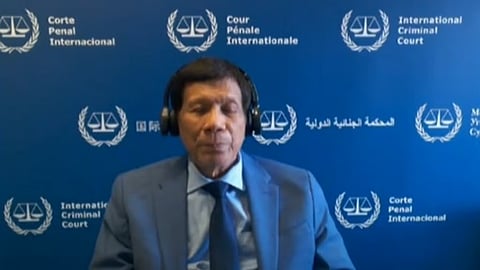
- NEWS
- the EDIT
- COMMENTARY
- BUSINESS
- LIFE
- SHOW
- ACTION
- GLOBAL GOALS
- SNAPS
- DYARYO TIRADA
- MORE

The prosecution has submitted a new set of evidence against former president Rodrigo Duterte in the International Criminal Court (ICC), bringing the total items to be used in the pre-trial stage in September to 320.
The document, dated 5 May, showed that lead prosecutor Karim Khan presented 139 additional pieces of evidence against Duterte, comprising documentary material that formed the basis of his arrest warrant.
The new items submitted on 30 April were categorized into four: contextual elements, modes of liability, murder during Duterte’s tenure as mayor, and murder under barangay clearance operations during his presidency.
The 139 items were part of the prosecution’s second disclosure of evidence, with the first accounting for 181 items.
This set of evidence is intended to further incriminate Duterte as an “indirect co-perpetrator” in the bloody war on drugs, in preparation for the confirmation of charges on 23 September, allowing the case to proceed to a full-blown trial.
The prosecution has until 1 July to complete the disclosure of their evidence.
Earlier, Khan disclosed that a body of evidence, consisting of 16 hours of audio and video files, nearly 9,000 pages of written materials, in addition to the testimonies of their two witnesses, is being prepared for the confirmation of charges.
The 80-year-old Duterte has been in ICC custody in The Hague, Netherlands, since his arrest on 11 March in Manila. He faces a single count of crimes against humanity that took place between 1 November 2011 and 16 March 2019, during his tenure as Davao City mayor and as president.
Records from the ICC showed that between November 2011 and March 2019, Duterte shared the so-called “common plan” with his co-perpetrators, including members of the Philippine National Police, the Philippine Drug Enforcement Agency, the National Bureau of Investigation, and high-ranking government officials.
The “common plan” refers to Duterte’s policies to eradicate illegal drugs, which allegedly involved systematic killings, torture, and other crimes to eliminate suspected drug offenders.
According to the ICC, the operations were implemented during his tenure as mayor of Davao City and later expanded nationwide upon his assumption of the presidency in 2016.
The government registered over 6,000 drug-related deaths only under Duterte’s presidency, though rights watchdogs estimate that the actual death toll could exceed 30,000—most of them from low-income communities.
Duterte’s lawyers—Nicholas Kaufman and Dov Jacobs—had already contested the ICC’s authority to release the former president, citing its supposed lack of jurisdiction.
They argued that the ICC "is not in a position to exercise jurisdiction in the Philippines situation after the country’s effective withdrawal from the Rome Statute."
This argument, however, simply mimicked the same grounds brought up by the Philippines when it sought to block the ICC from launching a reinvestigation into the war on drugs shortly after the country withdrew from the Rome Statute, according to ICC-accredited lawyer Gilbert Andres, and thus slimming the chances of it being considered by the tribunal.
The Philippines officially withdrew from the Rome Statute—the treaty that established the ICC—in March 2019 pursuant to Duterte’s marching orders.
The ICC has insisted, however, that it retains jurisdiction over crimes committed while the Philippines was still a state party to the treaty despite the country’s withdrawal.
